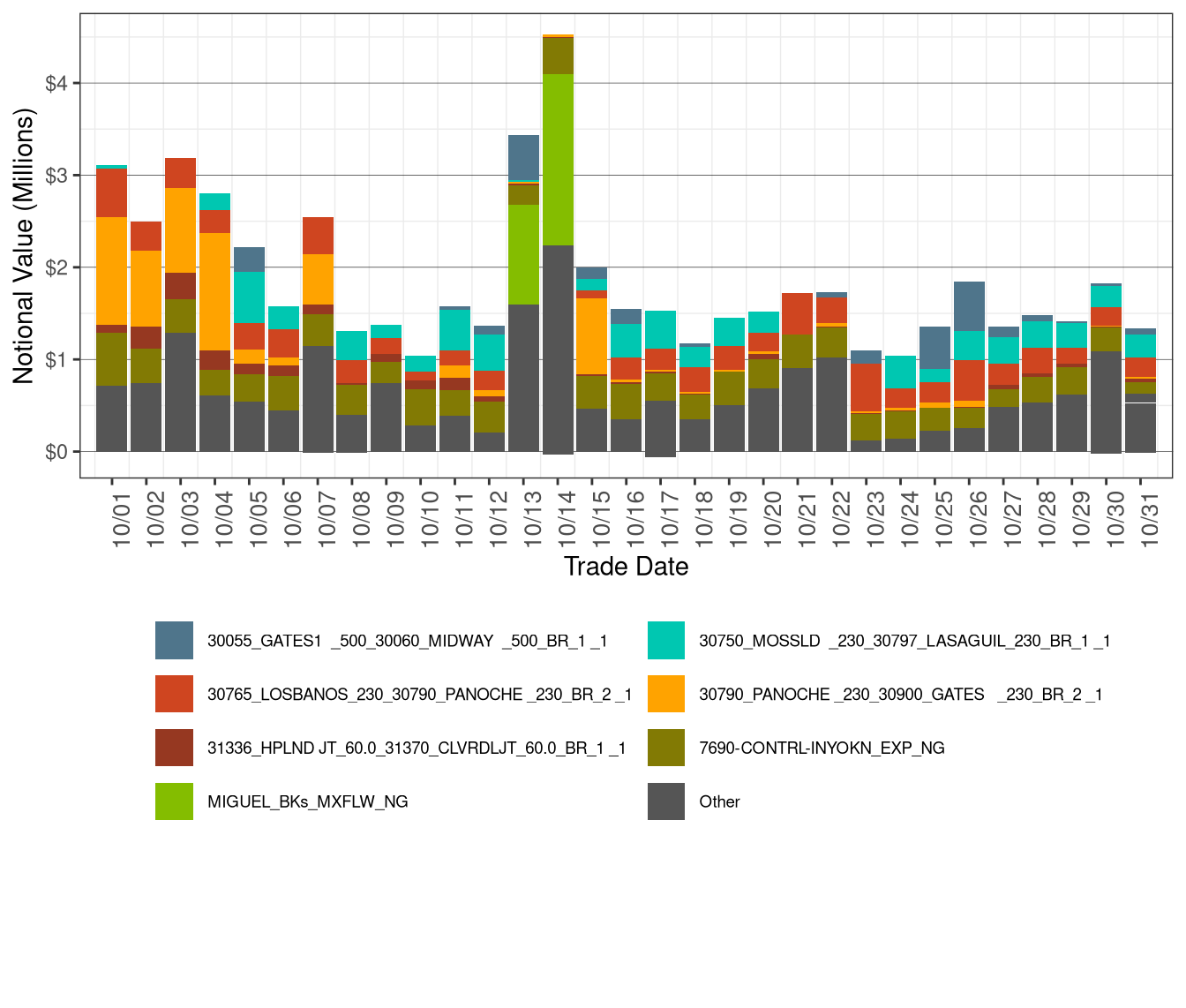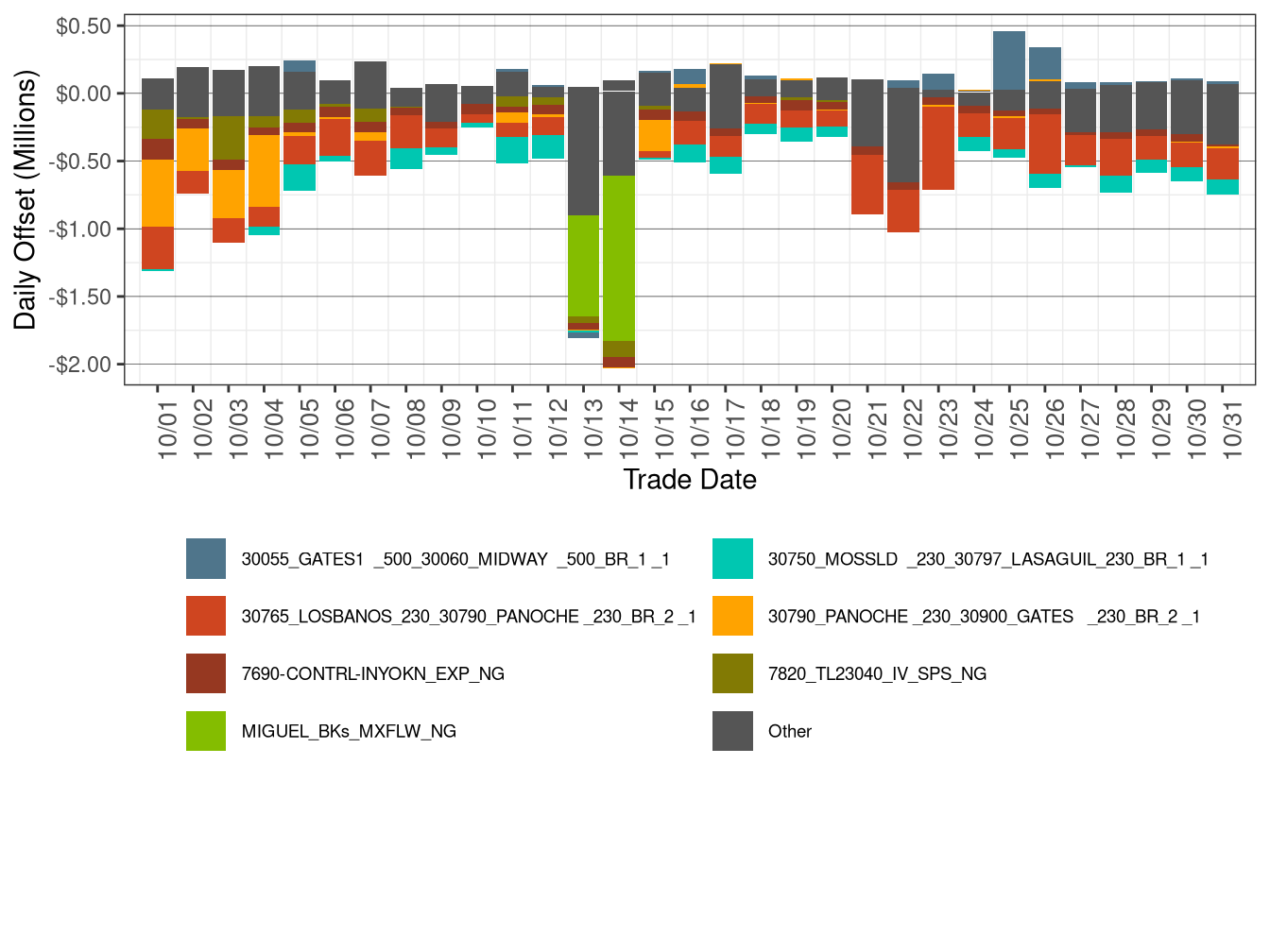Section 5 Congestion Revenue Rights
Congestion Revenue Rights are a financial tool developed for the purpose of allowing load and exports to hedge against congestion charges paid when congestion occurs on a transmission line (aka congestion rents as was described in the previous section). If the congestion occurs in the same direction the CRR is held for the CRR holder is paid, but the CRR holder may have an obligation to pay if congestion occurs in the opposite direction.
Congestion revenue rights auction efficiency 1B became effective on January 1, 2019. It includes key changes related to the congestion revenue rights settlements process:
- Targeted reduction of congestion revenue rights payouts on a constraint by constraint basis.
- Distribute congestion revenues to the extent that CAISO collected the requisite revenue on the constraint over the month. That is, implement a pro-rata funding for CRRs.
- Allow surpluses on one constraint in one hour to offset deficits on the same constraint in another hour over the course of the month.
- Only distribute surpluses to congestion revenue rights if the surplus is collected on a constraint that the congestion revenue right accrued a deficit, and only up to the full target payment value of the congestion revenue right.
- Distribute remaining surplus revenue at the end of the month, which are associated with constraints that collect more surplus over the month than deficits, to measured demand.
Monthly CRR Revenue
Figure 5.1 illustrates the daily CRR notional value in the corresponding month for the various transmission elements that experienced congestion during the month. CRR notional value is calculated as the product of CRR implied flow (MW) and constraint shadow price ($/MWh) in each hour per constraint and CRR.
Figure 5.1: Daily CRR Notional Value by Transmission Element

Figure 5.2 illustrates the daily CRR offset value in the corresponding month for the transmission elements that experienced congestion during the month. CRR offset value is the difference between the revenue collected from the congestion and the CRR notional value. A positive CRR offset value represents surplus and a negative CRR offset value represents shortfall.
As shown below, table 5.1 shows the percentage of monthly CRR deficit by transmission element and Table 5.2 shows the percentage of monthly CRR surplus by transmission element.
Figure 5.2: Daily CRR Offset Value by Transmission Element

| Constraint | Percent |
|---|---|
| 30765_LOSBANOS_230_30790_PANOCHE _230_BR_2 _1 | 28.61 |
| Other | 18.56 |
| 30750_MOSSLD _230_30797_LASAGUIL_230_BR_1 _1 | 10.06 |
| 30790_PANOCHE _230_30900_GATES _230_BR_2 _1 | 9.59 |
| MIGUEL_BKs_MXFLW_NG | 8.90 |
| 7690-CONTRL-INYOKN_EXP_NG | 8.65 |
| 7820_TL23040_IV_SPS_NG | 5.59 |
| 35352_WHISMAN _115_35356_MNTA VSA_115_BR_1 _1 | 2.72 |
| OMS IV-SX OUTAGE_NG | 2.63 |
| 22208_EL CAJON_69.0_22408_LOSCOCHS_69.0_BR_1 _1 | 2.60 |
| 99013_CAL CAPS_500_24801_DEVERS _500_BR_1 _1 | 2.10 |
| Constraint | Percent |
|---|---|
| 30055_GATES1 _500_30060_MIDWAY _500_BR_1 _1 | 28.97 |
| Other | 27.43 |
| 31336_HPLND JT_60.0_31370_CLVRDLJT_60.0_BR_1 _1 | 12.37 |
| NOB_ITC | 7.32 |
| AMR-SND 138 | 5.22 |
| 30060_MIDWAY _500_29402_WIRLWIND_500_BR_1 _2 | 4.07 |
| 34116_LE GRAND_115_34115_ADRA TAP_115_BR_1 _1 | 3.52 |
| 6410_CP10_NG | 3.30 |
| 34418_KINGSBRG_115_34405_FRWT TAP_115_BR_1 _1 | 2.78 |
| 35107_DUMBARTN_115_35120_NEWARK D_115_BR_1 _1 | 2.60 |
| 99002_MOE-ELD _500_24042_ELDORDO _500_BR_1 _2 | 2.42 |
The main reasons for CRR offset shortfall were
- The line 30765_LOSBANOS_230_30790_PANOCHE _230_BR_2 _1 was binding on 30 days of this month, resulting in offset shortfall of $6.30 million.
- The line 30750_MOSSLD _230_30797_LASAGUIL_230_BR_1 _1 was binding on 26 days of this month, resulting in offset shortfall of $2.19 million.
The main reasons for CRR offset surplus were
- The line 30055_GATES1 _500_30060_MIDWAY _500_BR_1 _1 was binding on 19 days of this month, resulting in offset surplus of $1.17 million.
Table 5.3 shows the percentage of monthly CRR payment by transmission element.
| Constraint | Percent |
|---|---|
| Other | 26.01 |
| 7690-CONTRL-INYOKN_EXP_NG | 21.81 |
| 30790_PANOCHE _230_30900_GATES _230_BR_2 _1 | 12.15 |
| 30750_MOSSLD _230_30797_LASAGUIL_230_BR_1 _1 | 11.40 |
| 30055_GATES1 _500_30060_MIDWAY _500_BR_1 _1 | 7.51 |
| 31336_HPLND JT_60.0_31370_CLVRDLJT_60.0_BR_1 _1 | 5.22 |
| 30765_LOSBANOS_230_30790_PANOCHE _230_BR_2 _1 | 4.19 |
| 99013_CAL CAPS_500_24801_DEVERS _500_BR_1 _1 | 3.39 |
| 99002_MOE-ELD _500_24042_ELDORDO _500_BR_1 _2 | 2.97 |
| MIGUEL_BKs_MXFLW_NG | 2.76 |
| 34548_KETTLEMN_70.0_34552_GATES _70.0_BR_1 _1 | 2.59 |
Table 5.4 shows the monthly CRR statistics. The Net Monthly Balancing Surplus calculates as CRR Surplus plus CRR Daily Balancing Account minus total auction revenue. The total auction revenue is the sum of Monthly Auction Revenue and Annual Auction Revenue. The Allocation to Measured demand is calculated as sum of total auction revenue and Net Monthly Balancing Surplus.
Net Monthly Balancing Surplus in October was $1.37 million. The auction revenues credited to the balancing account for October were $6.72 million. As a result, the balancing account had a surplus of approximately $8.09 million compared to $9.78 million in the previous month, which was allocated to measured demand.
| Description | OCTOBER -2025 | SEPTEMBER-2025 |
|---|---|---|
| CRR Notional Value | $57,713,222 | $66,769,007 |
| CRR Deficit | -$21,989,356 | -$25,250,659 |
| CRR Settlement Rule | -$1,625 | -$5,057 |
| CRR Adjusted Payment | $35,722,241 | $41,513,291 |
| CRR Surplus | $4,165,708 | $7,608,709 |
| Monthly Auction Revenue | $3,684,470 | $4,116,887 |
| Annual Auction Revenue | $3,040,521 | $2,176,253 |
| CRR Daily Balancing Account | $3,928,089 | $2,173,908 |
| Net Monthly Balancing Surplus | $1,368,806 | $3,489,477 |
| Allocation to Measured Demand | $8,093,797 | $9,782,617 |